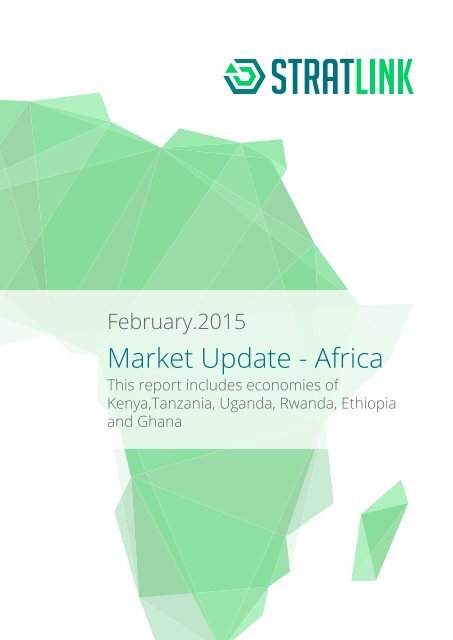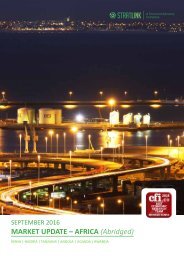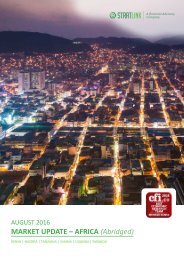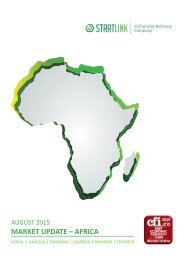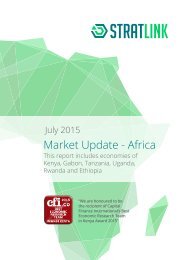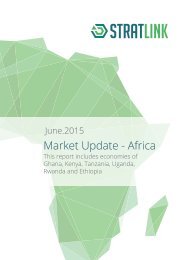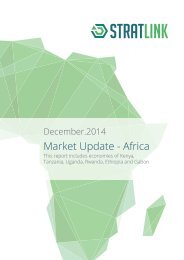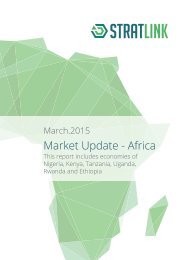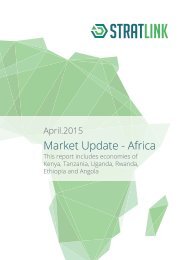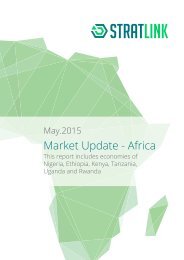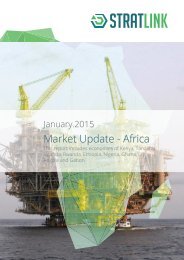You also want an ePaper? Increase the reach of your titles
YUMPU automatically turns print PDFs into web optimized ePapers that Google loves.
<strong>February</strong>.<strong>2015</strong><br />
<strong>Market</strong> <strong>Update</strong> - <strong>Africa</strong><br />
This report includes economies of<br />
Kenya,Tanzania, Uganda, Rwanda, Ethiopia<br />
and Ghana
01. Kenya<br />
2 | StratLink <strong>Africa</strong> Ltd.<br />
www.stratlinkglobal.com
MARKET UPDATE – AFRICA | <strong>February</strong> <strong>2015</strong><br />
POLITICAL OUTLOOK<br />
Muted Attacks Spell Hope for <strong>2015</strong><br />
Terror linked incidences have been muted in<br />
the January on the back of strategic changes<br />
in the top echelons of Kenya’s security apparatus<br />
at the end of 2014. Relative quiet<br />
might serve to prop up investor confidence<br />
in the country’s efforts to arrest the malaise<br />
of insecurity that plagued 2014.<br />
Reports of the surrender of a Senior Al Shabaab<br />
figure, Hassan Dhubi, to the Somali<br />
government (backed by Amisom 1 forces) on<br />
January 15th, <strong>2015</strong> will also serve to buoy<br />
perception of a fractured Al Shabaab militia.<br />
Investors will, however, also be on the<br />
lookout for possible retaliatory attacks as Al<br />
Shabaab seeks to rekindle hope among its<br />
followers.<br />
rate at 8.5%. In our assessment, retention<br />
of the benchmark rate is anchored on<br />
favourable trends in inflation and a need to<br />
check on liquidity, as the shilling remains depressed<br />
against major currencies. The nearterm<br />
outlook on price-levels is favourable<br />
driven by plummeting global oil prices and<br />
marginal movement in the food price index.<br />
We believe the January <strong>2015</strong> application for<br />
a precautionary loan from the International<br />
Monetary Fund is largely targeted at mitigating<br />
mounting currency risks.<br />
Foreign Exchange Reserves<br />
We believe the<br />
January <strong>2015</strong><br />
application for<br />
a precautionary<br />
loan from the<br />
International<br />
Monetary Fund is<br />
largely targeted<br />
at mitigating<br />
mounting<br />
currency risks.<br />
Anti-terrorism law: Poisoned Chalice?<br />
Domestically, controversy around the antiterror<br />
legislation is bound to heighten polarization<br />
along political lines. Extension of<br />
the period during which “suspected terrorists”<br />
can be held without trial from 90 to 360<br />
days is poised to continue eliciting concern<br />
as certain communities feel predisposed to<br />
targeting by the law.<br />
ECONOMIC OUTLOOK<br />
Monetary Policy: Cushioning the Shilling<br />
In line with our January <strong>2015</strong> update, the<br />
Central Bank retained an accommodative<br />
monetary policy keeping the benchmark<br />
Source: Central Bank, StratLink <strong>Africa</strong><br />
Propping up the shilling against the increasingly<br />
strong USD will be the focus of monetary<br />
policy in the coming months. The local<br />
unit continues to negatively drift further beyond<br />
the 90.0 units exchange mark against<br />
the US dollar.<br />
1 <strong>Africa</strong>n Union Mission to Somalia<br />
BUSINESS ENVIRONMENT<br />
The business climate is experiencing a mix of tail and head winds from the plummeting global oil prices. On<br />
the one hand, consumers and business operators are reaping from the highest drop in petroleum product<br />
prices. This is expected to augur well for the cost of doing business in the months ahead.<br />
On January 14th, <strong>2015</strong>, market regulator, ERC 2 , reported the highest drop in benchmark prices in four years<br />
with Super Petrol dropping by Kes 9.13/litre to Kes 92.9 whilst that of Diesel dropped by Kes 7.50/litre to Kes<br />
83.4 (Nairobi prices).<br />
On the flip side, the plummeting price of oil is dimming oil exploration efforts in the region. The plan by British<br />
Oil and Gas company, Afren, to slash its exploration budget speaks volumes of potential stress on the investment<br />
climate. Tullow Oil has also undertaken austerity measures in neighbouring countries such as Ethiopia<br />
in view of oil prices.<br />
2 Energy Regulatory Commission<br />
www.stratlinkglobal.com<br />
StratLink <strong>Africa</strong> Ltd.| 3
MARKET UPDATE – AFRICA | <strong>February</strong> <strong>2015</strong><br />
Central Bank<br />
will cautiously<br />
monitor liquidity<br />
trends in the<br />
money market<br />
with a view to<br />
supporting the<br />
shilling.<br />
Kenya Shilling vs USD Exchange<br />
Net Liquidity Injection (USD Mln)<br />
Source: Central Bank of Kenya, StratLink <strong>Africa</strong><br />
Source: Bloomberg, StratLink <strong>Africa</strong><br />
Short-term measures to prop-up<br />
shilling<br />
We expect the local unit to remain under<br />
pressure in the coming months driven by<br />
deterioration of the current account balance.<br />
This has principally been brought<br />
about by growing merchandise imports<br />
against depressed export earnings. Current<br />
account deficit as percentage of Gross Domestic<br />
Product (GDP) grew by 110.0 bps to<br />
9.9%, year-on-year, as at September 2014.<br />
Current Account Deficit (USD Mln)<br />
Year to<br />
Sep-12 - 4,057.0<br />
Sep-13 - 4,643.0<br />
Sep-14 - 5,293.0<br />
Current Account Deficit<br />
Strengthening greenback to<br />
undermine shilling’s long-term<br />
strength<br />
Further to unfavourable balance of trade affecting<br />
the shilling and improved macroeconomic<br />
environment in the United States the<br />
demand for the greenback in local markets<br />
with continue to increase. This is bound to<br />
keep the shilling on a relative weakening position<br />
against the dollar going forward. Our<br />
view is that the KES will trade in the 90-93.50<br />
range to the USD in the short term (30 days)<br />
and 89-94 in the medium term (180 days)<br />
Industries, such as steel manufacturers, that<br />
rely heavily on imported inputs will bear the<br />
brunt of the waning value of the shilling.<br />
Kenya Shillings exchange Rate vs<br />
Cost of steel<br />
Source: National Treasury, StratLink <strong>Africa</strong><br />
Central Bank will cautiously monitor liquidity<br />
trends in the money market with a view to<br />
supporting the shilling. In January <strong>2015</strong>, the<br />
bank recorded the first net liquidity withdrawal<br />
from the market in four months indicative<br />
of response to the shilling’s trends<br />
against major currencies.<br />
Source: National Bureau of Statistics, StratLink <strong>Africa</strong><br />
4 | StratLink <strong>Africa</strong> Ltd.<br />
www.stratlinkglobal.com
MARKET UPDATE – AFRICA | <strong>February</strong> <strong>2015</strong><br />
DEBT MARKET UPDATE<br />
In January <strong>2015</strong>, the yield curve exhibited<br />
marginal up-tick from the preceding<br />
month. The short-term end of the curve has<br />
trended downwards compared to December<br />
2014, indicative of reduced borrowing<br />
appetite by the government. This is in line<br />
with the 59.0 bps slash of the Kenya Banks’<br />
Reference Rate (KBRR) to 8.54% that targets<br />
keeping commercial bank lending rates on<br />
a downtrend.<br />
Bloomberg BVAL Yields Index<br />
A favourable outlook on inflation given the<br />
nose-diving global crude oil prices is also<br />
likely to further weigh down yields in the<br />
market. Inflation now stands at a sixteen<br />
months’ low and 100.0 bps above Central<br />
Bank’s lower margin target of 5.0%.<br />
Inflation Trend<br />
Yields are bound<br />
to experience<br />
downward<br />
pressure in the<br />
coming month<br />
pegged on the<br />
bid to tame<br />
government<br />
appetite for<br />
domestic<br />
borrowing.<br />
Source: National Bureau of Statistics, StratLink <strong>Africa</strong><br />
Source: Bloomberg, StratLink <strong>Africa</strong><br />
Yields are bound to experience downward<br />
pressure in the coming month pegged on<br />
the bid to tame government appetite for domestic<br />
borrowing. We note, however, that<br />
the government has faced revenue mobilization<br />
challenges in the first half of FY14/15<br />
and this could translate in borrowing above<br />
target.<br />
High Liquidity in the Money <strong>Market</strong><br />
The money market has been fairly liquid in<br />
January <strong>2015</strong> driven by government payments<br />
and repo maturities. The interbank<br />
rate has been on a downtrend closing the<br />
month at 6.5%, 74.0 bps lower than it did in<br />
December 2014.<br />
Interbank Rate<br />
91 Day T-Bill Accepted Bids (USD Mln)<br />
Source: Central Bank of Kenya, StratLink <strong>Africa</strong><br />
Source: Central Bank of Kenya, StratLink <strong>Africa</strong><br />
www.stratlinkglobal.com<br />
StratLink <strong>Africa</strong> Ltd.| 5
MARKET UPDATE – AFRICA | <strong>February</strong> <strong>2015</strong><br />
We expect the<br />
market to remain<br />
on an uptrend<br />
in the coming<br />
months driven by<br />
corporate actions<br />
that are likely to<br />
have investors<br />
price in bullish<br />
expectations on<br />
select counters.<br />
EQUITY MARKET UPDATE<br />
NSE 20 Share Index Trend<br />
USD 1.8 billion deal to put up a 960 megawatt<br />
coal power plant. In view of Kenya’s<br />
pursuits to bridge its energy deficit by injecting<br />
an additional 5,000.0 megawatts by<br />
2016, investors are likely to take an upbeat<br />
view of the counter at the exchange.<br />
Centum Share Performance<br />
Source: Bloomberg, StratLink <strong>Africa</strong><br />
+3.6 %<br />
NSE 20 Share Index<br />
change year-on-year<br />
NSE 20 Share Index Month-on-Month<br />
Source: Bloomberg, StratLink <strong>Africa</strong><br />
+ 2.9 %<br />
NSE 20 Share Index<br />
change month-onmonth<br />
Source: Bloomberg, StratLink <strong>Africa</strong><br />
The market started the year on a resilient<br />
note shrugging off concerns over the Capital<br />
Gains Tax that was widely expected to<br />
dampen investor activity. We note, however,<br />
the refusal by investment banks to collect<br />
the same on behalf of the Kenya Revenue<br />
Authority could have served to buoy<br />
investor activity.<br />
We expect the market to remain on an uptrend<br />
in the coming months driven by corporate<br />
actions that are likely to have investors<br />
price in bullish expectations on select<br />
counters.<br />
Centum has also sold off its stake in UAP Insurance<br />
generating an estimated USD 43.7<br />
million. The proceeds will play a central role<br />
in meeting the company’s increasing investment<br />
in projects spanning the Fast Moving<br />
Consumer Goods market and property development.<br />
Portfolio Diversification<br />
The portfolio diversification also presents a<br />
strength for the company that could be key<br />
in helping it mitigate shocks that slow down<br />
activity in particular sectors.<br />
Housing Finance: Beefing up the<br />
‘war chest’<br />
Mortgage lending company, Housing Finance<br />
Corporation, has received the greenlight<br />
from the Capital <strong>Market</strong>s Authority to<br />
raise additional capital to a tune of USD 38.2<br />
million through a rights issue in <strong>2015</strong>.<br />
Centum Investment: Sealing the deal<br />
A consortium including financial services<br />
firm, Centum Investment, has inked the<br />
6 | StratLink <strong>Africa</strong> Ltd.<br />
www.stratlinkglobal.com
MARKET UPDATE – AFRICA | <strong>February</strong> <strong>2015</strong><br />
Housing Finance Share Performance<br />
Source: Bloomberg, StratLink <strong>Africa</strong><br />
Whereas investors are bound to be bullish<br />
about Housing Finance given growing demand<br />
for housing, the company’s mortgage<br />
rate could play a negating role. With growing<br />
pressure on credit lenders to reduce interest<br />
rates in the country, cost of credit and<br />
ability to penetrate the borrowers’ market<br />
will be key in determining the share’s performance.<br />
Mortgage Rates Comparison 3<br />
(November 2014)<br />
theirs by 80.0 bps (to 16.5%) and 90.0 bps<br />
(to 9.2%) respectively.<br />
Safaricom Share Performance<br />
Source: Bloomberg, StratLink <strong>Africa</strong><br />
Whereas this change might largely be<br />
deemed as insignificant, the fact that it<br />
comes against the backdrop of an anticipated<br />
entry by Equity Bank into the Safaricom<br />
dominated mobile money market could<br />
stoke a bearish view, albeit benignly, from<br />
investors.<br />
With growing<br />
pressure on<br />
credit lenders to<br />
reduce interest<br />
rates in the<br />
country, cost of<br />
credit and ability<br />
to penetrate<br />
the borrowers’<br />
market will be key<br />
in determining<br />
the share’s<br />
performance.<br />
Source: Hass Consult 2014, StratLink <strong>Africa</strong><br />
Safaricom: Fighting on two fronts<br />
Mobile telephony company, Safaricom Ltd,<br />
shed a fraction of its market share of prepaid<br />
mobile subscribers by 130.0 bps to<br />
66.7% in the first quarter of FY2014/15 while<br />
competitors Airtel and Orange increased<br />
3 SCB – Standard Chartered Bank; CBA – Commercial Bank of<br />
<strong>Africa</strong>;- KCB – Kenya Commercial Bank<br />
www.stratlinkglobal.com<br />
StratLink <strong>Africa</strong> Ltd.| 7
MARKET UPDATE – AFRICA | <strong>February</strong> <strong>2015</strong><br />
02. Tanzania<br />
8 | StratLink <strong>Africa</strong> Ltd.<br />
www.stratlinkglobal.com
MARKET UPDATE – AFRICA | <strong>February</strong> <strong>2015</strong><br />
POLITICAL OUTLOOK<br />
Uncertainty Looms over<br />
Referendum<br />
Uncertainty abounds over the constitutional<br />
referendum as a section of stakeholders<br />
raise concern over what they term as delay<br />
in meeting set timelines for preparation.<br />
This is bound to strain the country’s political<br />
risk perception as a new dispensation<br />
is widely expected to play a central role in<br />
laying the ground for the October <strong>2015</strong> election.<br />
Debate on the constitution is largely informed<br />
by divided opinion over retention of<br />
a two-tier union (backed by the current government)<br />
or adoption of a three tier structure<br />
(backed by factions of the opposition) 4 .<br />
BUSINESS ENVIRONMENT<br />
Investors are likely to remain guarded about the investment<br />
climate against the backdrop of backlash from development<br />
partners following the USD 122.0 million energy scandal and<br />
the forthcoming voting cycle. The scheduling of the referendum<br />
in April <strong>2015</strong> and the election in October <strong>2015</strong> means<br />
that the country will be caught in election mood for the better<br />
part of <strong>2015</strong>. This environment is bound to decelerate<br />
momentum gained in boosting investor perception after the<br />
country lifted caps set on foreign investor participation in the<br />
equity and debt markets.<br />
Export Performance (USD Mln)<br />
Referendum: Bumpy Road Ahead<br />
Noting that the opposition boycotted the<br />
constitution drafting process in 2014, actualization<br />
of the referendum is bound to<br />
present the government with rough terrain.<br />
The opposition is capitalizing on the setback<br />
laden process to rally the public.<br />
Whereas the government insists the referendum<br />
will take place as planned on April<br />
30th, <strong>2015</strong>, factions such as the Civic United<br />
Front have raised doubts about feasibility of<br />
the exercise on the planned date.<br />
ECONOMIC OUTLOOK<br />
Depressed Exports to Weigh Down<br />
Shilling<br />
Weak exports have set the economy on a<br />
feeble footing at the start of the year, with<br />
the shilling reflecting fragile trends in the<br />
global markets. Earnings from Gold and traditional<br />
exports stood at a three year low<br />
as at October 2014 (according to the latest<br />
data), indicating that the current account<br />
balance is poised to come under pressure<br />
in the near future. Investors should expect<br />
a depressed local unit and upward pressure<br />
on inflation owing to cost-push considerations<br />
from imported commodities.<br />
Source: Bank of Tanzania, StratLink <strong>Africa</strong><br />
Export earnings are sliding on the back of<br />
tanking global commodity prices. The value<br />
of gold export earnings declined by 22.6%,<br />
year-on-year, to USD 1.4 billion. Earnings<br />
from traditional exports – tobacco, coffee,<br />
cotton, Cashew nuts, tea, clovers and sisal<br />
– declined by 8.7% to USD 768.2 million.<br />
In the same period, the value of imports<br />
nudged upwards marginally by 0.2% to USD<br />
10.8 billion.<br />
Shilling: Fragile trend<br />
We assess that additional pressure on the<br />
shilling has come from the deferred budget<br />
support, to the tune of USD 500.0 million,<br />
by development partners. This is creating<br />
supply shortage of foreign currency in the<br />
domestic market.<br />
Earnings from<br />
Gold and<br />
traditional exports<br />
stood at a three<br />
year low as at<br />
October 2014<br />
(according to<br />
the latest data),<br />
indicating that the<br />
current account<br />
balance is poised<br />
to come under<br />
pressure in the<br />
near future.<br />
4 Please refer to our May 2014 <strong>Market</strong> <strong>Update</strong> for detailed<br />
analysis of the two-tier versus three-tier union and<br />
implications. www.stratlinkglobal.com<br />
www.stratlinkglobal.com<br />
StratLink <strong>Africa</strong> Ltd.| 9
MARKET UPDATE – AFRICA | <strong>February</strong> <strong>2015</strong><br />
Downward<br />
pressure on<br />
the shilling will<br />
persist pending<br />
investigations on<br />
the graft charges<br />
which occasioned<br />
the withholding of<br />
budget support.<br />
As indicated,<br />
Tanzania is a<br />
net importing<br />
economy and will<br />
bear the brunt<br />
of the weakened<br />
shilling in the cost<br />
of imports.<br />
Tanzania Shilling vs USD Exchange<br />
Source: Bloomberg, StratLink <strong>Africa</strong><br />
In Q4, 2014, the local unit appeared to have<br />
established a resistance line of 1,749.0 units<br />
to the greenback. This rate was breached on<br />
January 15th, <strong>2015</strong> with the local unit plummeting<br />
to 1770.0 units.<br />
Downward pressure on the shilling will<br />
persist pending investigations on the graft<br />
charges which occasioned the withholding<br />
of budget support. As indicated, Tanzania is<br />
a net importing economy and will bear the<br />
brunt of the weakened shilling in the cost of<br />
imports.<br />
Food Index Harbingers Uptick in<br />
Inflation<br />
The food index has also been drifting upwards<br />
since the start of Q4, 2014 and despite<br />
favourable global oil prices, this could<br />
begin inflicting upward pressure on inflation.<br />
Inflation vs Food Index<br />
DEBT MARKET UPDATE<br />
Yields in the T-Bill market appeared to correct<br />
in January <strong>2015</strong> after a spike in Q4,<br />
2014 that is likely to have been driven by<br />
the with-holding of budget support funding.<br />
In September 2014, coinciding with the suspension<br />
of budget support, the bids accepted<br />
from domestic borrowing were about<br />
twice as much as the monthly average.<br />
T-Bill Accepted Bids (USD Mln)<br />
Source: Bank of Tanzania, StratLink <strong>Africa</strong><br />
January <strong>2015</strong> uptake of domestic debt by<br />
the government has been comparatively<br />
modest and could be signalling moderation<br />
of its appetite going forward. We note<br />
that with planned issuance of a Eurobond<br />
in <strong>2015</strong>, the government will be keen to<br />
check its fiscal balance in a bid to create a<br />
favourable backdrop for tapping into the international<br />
market.<br />
T-Bill Yields<br />
Source: National Bureau of Statistics, StratLink <strong>Africa</strong><br />
Source: Bank of Uganda, StratLink <strong>Africa</strong><br />
10 | StratLink <strong>Africa</strong> Ltd.<br />
www.stratlinkglobal.com
MARKET UPDATE – AFRICA | <strong>February</strong> <strong>2015</strong><br />
The 182 Day and 364 Day papers closed January<br />
<strong>2015</strong> at 14.6% and 15.0%, respectively,<br />
100.0 bps and 160.0 bps lower than they did<br />
December 2014. The instruments reported<br />
oversubscription levels pointing at high liquidity<br />
in the money market.<br />
EQUITY MARKET UPDATE<br />
Dar es Salaam All Share Index<br />
+40.0 %<br />
All Share Index yearon-year<br />
change<br />
January <strong>2015</strong> T-Bill Subscription<br />
Paper<br />
Bid-to-cover Ratio<br />
91 Day 0.9<br />
182 Day 2.9<br />
364 Day 5.4<br />
Source: Bank of Tanzania, StratLink <strong>Africa</strong><br />
Bank of Tanzania to Check High<br />
Liquidity<br />
In view of the depressed shilling, we anticipate<br />
Bank of Tanzania to be aggressive in<br />
mopping up excess liquidity in the coming<br />
months with a view to provide support.<br />
Source: Bloomberg, StratLink <strong>Africa</strong><br />
Dar es Salaam All Share Index<br />
Month-on-Month<br />
+11.2 %<br />
All Share Index<br />
month-on-month<br />
change<br />
Interbank Rate vs Volumes<br />
Source: Bloomberg, StratLink <strong>Africa</strong><br />
Source: Bank of Tanzania, StratLink <strong>Africa</strong><br />
The market began <strong>2015</strong> on upbeat mode<br />
with apparent correction from the December<br />
2014 slump. The trend has been driven<br />
by a rebound in Tanzania Breweries Ltd’s<br />
counter which has rallied in the month of<br />
January <strong>2015</strong>.<br />
The interbank rate closed January at 7.6%,<br />
230.0 bps lower than it stood at the close of<br />
December 2014. The interbank rate is now<br />
approaching lows last seen between in October<br />
2014.<br />
www.stratlinkglobal.com<br />
StratLink <strong>Africa</strong> Ltd.| 11
MARKET UPDATE – AFRICA | <strong>February</strong> <strong>2015</strong><br />
Counters in the<br />
industrial and<br />
allied segment<br />
have retained the<br />
lead in market<br />
performance and<br />
are poised to<br />
remain so given<br />
the favourable oil<br />
prices.<br />
Tanzania Breweries Ltd<br />
Source: Bloomberg, StratLink <strong>Africa</strong><br />
The Brewery’s rebound has been driven by<br />
strong results for the period to September<br />
2014 that saw revenues surge by 8.0% while<br />
operating profit grew by 17.0%. The company,<br />
however, faces headwinds in the quarter<br />
under way owing to the battered shilling<br />
that is bound to raise the cost of imported<br />
inputs.<br />
Oil prices likely to keep bears away<br />
Counters in the industrial and allied segment<br />
have retained the lead in market performance<br />
and are poised to remain so given<br />
the favourable oil prices.<br />
Sector Indices Comparison<br />
Dec ‘14 Jan ‘15 Change<br />
Industrial & Allied 3,461.0 6,260.4 80.9%<br />
Commercial Services 2,006.9 3,011.5 50.0%<br />
Banking & Finance 2,648.5 3,608.2 36.2%<br />
Source: Bloomberg, StratLink <strong>Africa</strong><br />
12 International Monetary Fund Region Outlook October 2014<br />
12 | StratLink <strong>Africa</strong> Ltd.<br />
www.stratlinkglobal.com
MARKET UPDATE – AFRICA | <strong>February</strong> <strong>2015</strong><br />
03. Uganda<br />
www.stratlinkglobal.com<br />
StratLink <strong>Africa</strong> Ltd.| 13
MARKET UPDATE – AFRICA | <strong>February</strong> <strong>2015</strong><br />
POLITICAL OUTLOOK<br />
Uganda and International Criminal<br />
Court (ICC)<br />
President Yoweri Museveni received much<br />
needed support in his push for <strong>Africa</strong>n<br />
states to pull out of the ICC. In the concluded<br />
<strong>Africa</strong>n Union summit, Heads of State<br />
drummed up support against being signatories<br />
to the Rome Statute. Crumbled cases<br />
against Kenyan and Sudanese Presidents,<br />
Uhuru Kenyatta and Omar al-Bashir, respectively,<br />
are likely to give impetus to deliberations<br />
against ICC. Whereas there has been<br />
no indication of retributive action from the<br />
international community, concerns over<br />
inadequate domestic capacity to mete out<br />
justice in view of high crimes will top development<br />
partners’ concern. Ongoing turmoil<br />
in South Sudan will furnish a poignant case<br />
in point for tabling concern over vulnerability<br />
of states to crimes against humanity.<br />
Whereas the handing over of former Lord’s<br />
Resistance Army Commander, Dominic Ongwen,<br />
to the ICC was deemed confusing by<br />
many, we note that Uganda was compelled<br />
to do so as a signatory to the Rome Statute.<br />
ECONOMIC OUTLOOK<br />
Mining and Agriculture Lead Credit<br />
Growth<br />
Mining and agriculture registered the fastest<br />
acceleration of private sector credit between<br />
<strong>February</strong> and November 2014, pointing<br />
at investor vibrancy in the two sectors.<br />
We expect the mining sector to retain pole<br />
position in growth of credit as the country<br />
rushes to meet targeted commercial oil<br />
production by 2016. Plummeting oil prices<br />
could, however, keep activity at sub-optimal<br />
levels as investors slash exploration expenditure<br />
plans, especially if prices remain depressed<br />
into 2016.<br />
Growth in Private Sector Credit<br />
(Feb ’14 – Nov ’14)<br />
BUSINESS ENVIRONMENT<br />
Commercial bank lending rates remain high in the economy<br />
threatening growth and investment prospects for private sector<br />
players in <strong>2015</strong>. At 22.2%, Uganda’s average lending rate<br />
fares relatively poorly against Kenya’s 16.0% and presents<br />
a challenge in access to credit which is a key catalyst for a<br />
competitive business climate. According to World Bank’s Ease<br />
of Doing Business <strong>2015</strong> (ranking 189 countries), Uganda trails<br />
Rwanda and Kenya in facilitating access to credit.<br />
Ease of Access to Credit Ranking <strong>2015</strong><br />
Country<br />
Rwanda 4<br />
Ranking<br />
Kenya 116<br />
Uganda 131<br />
Tanzania 151<br />
Source: Bank of Uganda, StratLink <strong>Africa</strong><br />
New discoveries buoy investor activity<br />
In August 2014, discovery of new oil wells<br />
that increased Uganda’s projected reserves<br />
by 85.7% to 6.5 billion barrels occasioned a<br />
surge in the sector’s uptake of credit. The<br />
new estimate of reservoirs places Uganda<br />
at par with giant oil producers such as Sudan<br />
and South Sudan (combined) whose reserves<br />
are estimated at 5.0 billion barrels 5 .<br />
Egypt, with reserves estimated at 4.4 billion<br />
barrels now falls below Uganda’s capacity.<br />
Ethiopia 165<br />
Source: World Bank, StratLink <strong>Africa</strong><br />
5 Sudan accounts for 1.5 billion barrels while South Sudan<br />
accounts for 3.5 billion barrels<br />
14 | StratLink <strong>Africa</strong> Ltd.<br />
www.stratlinkglobal.com
MARKET UPDATE – AFRICA | <strong>February</strong> <strong>2015</strong><br />
Credit to Mining Sector Breakdown<br />
Manufacturing Trails<br />
Source: Bank of Uganda, StratLink <strong>Africa</strong><br />
The manufacturing sector reported a comparatively<br />
marginal 5.7% increase in private<br />
sector credit between <strong>February</strong> 2014 and<br />
November 2014 to stand at USD 443.8 million.<br />
We anticipate this relatively low performance<br />
to persist pegged on the headwinds<br />
the country’s exports are facing as its key<br />
destination, South Sudan, remains in political<br />
turmoil.<br />
South Sudan is Uganda’s single largest export<br />
destination (country), after Kenya, accounting<br />
for 12.7% of formal exports (Kenya<br />
accounted for 22.8%) as at November 2014.<br />
Uganda Exports to South Sudan<br />
(USD Mln)<br />
DEBT MARKET UPDATE<br />
Inflation is bound to remain subdued in<br />
the coming month as the general trend of<br />
food and global oil prices looks south. After<br />
a slight uptick in November, inflation was<br />
back to 1.8% in December 2014 affirming an<br />
investor friendly horizon in the near term.<br />
Inflation vs Food Index<br />
Source: Bank of Uganda, StratLink <strong>Africa</strong><br />
Long-term Inflation Subject to<br />
Pressures<br />
The long-term outlook is, however, subject<br />
to pressures emanating from the weakening<br />
shilling and seasonal shortages of food<br />
supplies that could push inflation upward.<br />
As such, we believe this could be a key factor<br />
driving long-term yields north while shortterm<br />
yields exhibit marginal movement.<br />
Yield Curve<br />
Whereas there has<br />
been no indication<br />
of retributive<br />
action from the<br />
international<br />
community,<br />
concerns over<br />
inadequate<br />
domestic capacity<br />
to mete out justice<br />
in view of high<br />
crimes will top<br />
development<br />
partners’ concern.<br />
Ongoing turmoil<br />
in South Sudan<br />
will furnish a<br />
poignant case in<br />
point for tabling<br />
concern over<br />
vulnerability of<br />
states to crimes<br />
against humanity.<br />
Source: Bank of Uganda, StratLink <strong>Africa</strong><br />
Source: Bank of Uganda, StratLink <strong>Africa</strong><br />
www.stratlinkglobal.com<br />
StratLink <strong>Africa</strong> Ltd.| 15
MARKET UPDATE – AFRICA | <strong>February</strong> <strong>2015</strong><br />
- 4.9 %<br />
Uganda shilling<br />
depreciation monthon-month<br />
-16.4 %<br />
Uganda shilling<br />
depreciation yearon-year<br />
Shilling tumbles<br />
The shilling started <strong>2015</strong> by breaching its<br />
2,780 units of exchange to the US dollar<br />
support line (Q4, 2014). High dollar demand<br />
by oil importers has been cited as the driving<br />
factor in driving depreciation of the local<br />
unit. Balance of payment imbalances,<br />
aggravated by the situation in South Sudan,<br />
have also been central in keeping the shilling<br />
under immense pressure.<br />
Uganda Shilling vs USD Exchange<br />
EQUITY MARKET UPDATE<br />
Uganda Stock Exchange All Share<br />
Index<br />
Source: Bloomberg, StratLink <strong>Africa</strong><br />
+31.9 %<br />
All Share Index yearon-year<br />
change<br />
Source: Bank of Uganda, StratLink <strong>Africa</strong><br />
UGSE All Share Month-on-month<br />
+10.8 %<br />
All Share Index<br />
month-on-month<br />
change<br />
We expect Bank of Uganda to continue<br />
tightening liquidity in the money market to<br />
prop up the shilling.<br />
Average Overnight Interbank Rate<br />
Source: Bloomberg, StratLink <strong>Africa</strong><br />
Source: Bank of Uganda, StratLink <strong>Africa</strong><br />
The market began the year on an upbeat<br />
mode with the All Share Index surging by<br />
double digits both on a month-on-month<br />
and year-on-year basis to the close of January<br />
<strong>2015</strong>. Relatively strong performance by<br />
banking counters, notably Stanbic and Bank<br />
of Baroda, has been central in driving the<br />
market to a rally.<br />
16 | StratLink <strong>Africa</strong> Ltd.<br />
www.stratlinkglobal.com
MARKET UPDATE – AFRICA | <strong>February</strong> <strong>2015</strong><br />
Bank of Baroda Share Performance<br />
Source: Bloomberg, StratLink <strong>Africa</strong><br />
Umeme likely to weigh down market<br />
Noting, however, that electricity distributing<br />
company, Umeme Ltd, accounts for about<br />
65.0% of market turnover, its recent tepid<br />
performance is likely to weigh down the<br />
market going forward.<br />
Umeme Share Performance<br />
Source: Bloomberg, StratLink <strong>Africa</strong><br />
www.stratlinkglobal.com<br />
StratLink <strong>Africa</strong> Ltd.| 17
MARKET UPDATE – AFRICA | <strong>February</strong> <strong>2015</strong><br />
04. Rwanda<br />
18 | StratLink <strong>Africa</strong> Ltd.<br />
www.stratlinkglobal.com
MARKET UPDATE – AFRICA | <strong>February</strong> <strong>2015</strong><br />
POLITICAL OUTLOOK<br />
Treading a Tight Rope with DRC<br />
Strained relations between Rwanda and<br />
Democratic Republic of Congo started <strong>2015</strong><br />
on a note of uneasy calm. President Paul<br />
Kagame (Rwanda) has decried what he<br />
terms as inaction by the DRC government<br />
and the UN mission in Congo in efforts to<br />
disarm Rwandese rebel forces (FDLR 6 ) in<br />
DRC. Investors will be keen to place Rwanda-DRC<br />
relations on the radar noting that<br />
alleged links between Kagame’s administration<br />
and the M23 rebels (in DRC) occasioned<br />
the suspension of donor aid to Rwanda in<br />
2012/13. The suspension of aid adversely<br />
affected Rwanda’s macroeconomic and investment<br />
climate, decelerating growth momentum<br />
from 7.2% in 2012 to 4.6% in 2013.<br />
Will forceful disarmament be<br />
employed?<br />
FDLR has flouted the disarmament ultimatum<br />
(January 02nd, <strong>2015</strong>) set by the United<br />
Nations. As a result, the focus going forward<br />
will be on measures taken towards disarmament<br />
of the forces and how it affects<br />
Rwanda’s security.<br />
ECONOMIC OUTLOOK<br />
Agriculture and Industry Growth Rates<br />
Source: National Bank of Rwanda, StratLink <strong>Africa</strong><br />
Upbeat Service Sector to attract<br />
investors<br />
Meanwhile, the service sector remains upbeat<br />
registering near double digit growth,<br />
notably driven by the wholesale and retail<br />
segment. The sector’s growth has recovered<br />
from a mild slump in 2013 with growth now<br />
standing 100.0 bps above the two year average<br />
of 8.1% as indicated by the red line<br />
below.<br />
Investors will be<br />
keen to place<br />
Rwanda-DRC<br />
relations on the<br />
radar noting<br />
that alleged<br />
links between<br />
Kagame’s<br />
administration<br />
and the M23<br />
rebels (in DRC)<br />
occasioned<br />
the suspension<br />
of donor aid<br />
to Rwanda in<br />
2012/13.<br />
Lifting Agriculture and Industry<br />
Policy makers will be hard pressed to haul<br />
agriculture and industry out of slow growth<br />
rut with a view to vaulting the economy<br />
back to strong growth in Q1, <strong>2015</strong>. Growth<br />
in the two sectors decelerated in the recent<br />
past as agriculture was battered by a blend<br />
of adverse weather and depressed prices<br />
while industry (driven largely by agro-processing)<br />
is likely to have suffered a knock-on<br />
effect from agriculture.<br />
Improving economic performance and investor<br />
perception tops the agenda in <strong>2015</strong><br />
and agriculture and industry (about 40.0%<br />
of GDP 7 ) will be central to this agenda.<br />
6 Democratic Forces for Liberation of Rwanda<br />
7 Agriculture constitutes 34% of GDP (Rwanda Agriculture<br />
Board) while industry constitutes 7.0%<br />
BUSINESS ENVIRONMENT<br />
Investors are eagerly anticipating the New Investment Code<br />
following the tabling of the draft before parliament in January<br />
<strong>2015</strong>. Media reports 8 indicate the new code eyes scaling<br />
down tax rates for export oriented commodities, a matter<br />
poised to whet appetite towards investment in export skewed<br />
areas. Further, the new code is reported to be targeting lower<br />
electricity tariffs for industries with a view to catalysing manufacturing.<br />
Manufacturing and industry in Rwanda is emerging from a low<br />
base and there is need to catalyse growth. At an estimated<br />
7.0% of GDP, there is enormous room for growth. Given a relatively<br />
strained economic climate in the country, the adoption<br />
of the code is likely to be fast-tracked with a view to cushioning<br />
the economy by stimulating investment.<br />
8 The East <strong>Africa</strong>n Weekly, January 17th, <strong>2015</strong><br />
www.stratlinkglobal.com<br />
StratLink <strong>Africa</strong> Ltd.| 19
MARKET UPDATE – AFRICA | <strong>February</strong> <strong>2015</strong><br />
The Consumer<br />
Price Index<br />
continues to<br />
trend downwards<br />
further giving<br />
impetus to<br />
subdued yields<br />
in the T-Bill<br />
market. The near<br />
term outlook is<br />
bound to remain<br />
favourable for<br />
investors as<br />
inflation risk<br />
is mitigated by<br />
depressed oil<br />
prices.<br />
Service Sector Growth<br />
Source: Bank of Rwanda, StratLink <strong>Africa</strong><br />
Rising income levels have served to make<br />
the wholesale and retail segment buoyant,<br />
driving growth in the service sector. Investors<br />
are bound to maintain keen interest<br />
on this segment of the sector with a view to<br />
cashing in on growing consumption in the<br />
market.<br />
Per Capita Income (USD)<br />
Bids Accepted (USD Mln)<br />
Source: Bank of Rwanda, StratLink <strong>Africa</strong><br />
The 91 Day paper closed January <strong>2015</strong> at<br />
4.10% while the 182 Day closed the month<br />
at 5.0%, representing very marginal changes<br />
on each from December 2014. The 364<br />
Day, on the other hand, closed January <strong>2015</strong><br />
at 6.0%, twenty five bps lower than it did December<br />
2014.<br />
T-Bill Yields<br />
Source: Bank of Rwanda, StratLink <strong>Africa</strong><br />
Source: BMI 2014, StratLink <strong>Africa</strong><br />
DEBT MARKET UPDATE<br />
Yields have been largely stable in the T-Bill<br />
market reporting marginal movement in<br />
January <strong>2015</strong>. This is consistent with government<br />
appetite for domestic borrowing<br />
which has registered marginal changes in<br />
the last three months. In the latter part of<br />
2014, we witnessed volatility in yields in<br />
what we believe was occasioned by hiccups<br />
in disbursement of public funds that could<br />
have seen the government reach for domestic<br />
borrowing.<br />
The Consumer Price Index continues to<br />
trend downwards further giving impetus to<br />
subdued yields in the T-Bill market. The near<br />
term outlook is bound to remain favourable<br />
for investors as inflation risk is mitigated by<br />
depressed oil prices.<br />
Consumer Price Index<br />
Source: National Bureau of Statistics, StratLink <strong>Africa</strong><br />
20 | StratLink <strong>Africa</strong> Ltd.<br />
www.stratlinkglobal.com
MARKET UPDATE – AFRICA | <strong>February</strong> <strong>2015</strong><br />
The volatile franc in the global exchange<br />
markets could, however, leave investors<br />
guarded as to what to anticipate in the coming<br />
months. Bouts of appreciation and depreciation<br />
have characterized the franc in<br />
the recent past, potentially inhibiting investor<br />
projection of the local unit’s near term<br />
trajectory.<br />
EQUITY MARKET UPDATE<br />
Rwanda Stock Exchange All Share Index<br />
-1.2 %<br />
All Share Index yearon-year<br />
change<br />
Rwanda Franc vs USD Exchange<br />
+1.7 %<br />
All Share Index<br />
month-on-month<br />
change<br />
Source: Bloomberg, StratLink <strong>Africa</strong><br />
RSE All Share Index Month-on-month<br />
+0.5 %<br />
Rwanda franc<br />
month-on-month<br />
depreciation<br />
Source: Bloomberg, StratLink <strong>Africa</strong><br />
Likely Mounting Pressure on the Franc<br />
The local unit is, however, bound to face<br />
increasing pressure in the coming month<br />
pegged on rising liquidity in the money market.<br />
The interbank rate closed 2014 at 4.7%,<br />
100.0 bps lower than it did November 2014.<br />
Interbank Rate<br />
Source: National Bureau of Statistics, StratLink <strong>Africa</strong><br />
Source: Bloomberg, StratLink <strong>Africa</strong><br />
It has been a month of mixed performance<br />
at the exchange with the All Share Index<br />
plunging on January 19th, <strong>2015</strong> and rapidly<br />
correcting in the succeeding days.<br />
Bralirwa Share Performance<br />
Source: Bloomberg, StratLink <strong>Africa</strong><br />
+1.3 %<br />
Rwanda franc yearon-year<br />
depreciation<br />
Bralirwa remains<br />
the counter<br />
dictating market<br />
direction and<br />
investors will be<br />
keen to see how<br />
the company<br />
pursues new<br />
export markets<br />
in <strong>2015</strong> following<br />
punitive levies for<br />
their products in<br />
the DRC.<br />
www.stratlinkglobal.com<br />
StratLink <strong>Africa</strong> Ltd.| 21
MARKET UPDATE – AFRICA | <strong>February</strong> <strong>2015</strong><br />
05. Ethiopia<br />
22 | StratLink <strong>Africa</strong> Ltd.<br />
www.stratlinkglobal.com
MARKET UPDATE – AFRICA | <strong>February</strong> <strong>2015</strong><br />
POLITICAL OUTLOOK<br />
Turkey takes a bite at the cherry<br />
The visit by a Turkish delegation including<br />
the President and business magnates<br />
adds a feather onto Ethiopia’s cap as a target<br />
trade partner for fast emerging economies.<br />
Turkey is among the world’s fastest<br />
growing emerging economies having averaged<br />
about 6.1% between 2010 and 2013<br />
and ranks as the world’s seventeenth largest<br />
economy. From a political stand-point,<br />
Ethiopia continues to be viewed as a vital<br />
partner in the volatile Horn of <strong>Africa</strong> with<br />
influence in bodies like <strong>Africa</strong>n Union and<br />
IGAD 9 . The move by Turkey, coming just<br />
four months before the general election,<br />
could also be perceived by investors as a salient<br />
vote of confidence in view of pre- and<br />
post-election environment consideration.<br />
Voter registration ahead of the May <strong>2015</strong><br />
election commenced on January 12th,<br />
<strong>2015</strong>. Sixty out seventy five registered political<br />
parties are expected to contest in the<br />
race for federal parliament and/or regional<br />
councils.<br />
BUSINESS ENVIRONMENT<br />
Investment in the manufacturing sector is poised to remain<br />
the focus of streamlining the business climate in the coming<br />
months. Between January 12th and 17th, <strong>2015</strong>, the Ethiopian<br />
government engaged its Japanese counterpart in Industrial<br />
Development Policy dialogue aimed at improving Ethiopia’s<br />
competitiveness. Regionally, Ethiopia enjoys favourable cost of<br />
energy and labour costs that are attractive to manufacturers.<br />
Focusing on Export Competitiveness<br />
The focus, going forward, is likely to be skewed towards boosting<br />
exports following the World Bank’s proposal that Ethiopia<br />
devalues its currency in 2014.<br />
Economic Growth vs Govt<br />
Expenditure<br />
-0.6 %<br />
Birr depreciation<br />
month-on-month<br />
ECONOMIC OUTLOOK<br />
Buoyed Fiscal Position<br />
The country starts <strong>2015</strong> with a buoyed fiscal<br />
position following the successful issuance<br />
of the December 2014 Eurobond that attracted<br />
bids worth USD 5.2 billion, reporting<br />
260.0% oversubscription. Strong performance<br />
by the bond is crucial to Ethiopia in<br />
view of two considerations:<br />
Government Driven <strong>Market</strong><br />
Ethiopia’s economy is largely state driven<br />
and a sound fiscal position capable of<br />
funding infrastructure and development<br />
projects is a vital engine in generating a<br />
favourable climate for investors. As such,<br />
the government’s buoyed position will be<br />
essential in outlining the <strong>2015</strong> expenditure<br />
plan and helping to sustain the economic<br />
momentum.<br />
Source: IMF Data 2014, StratLink <strong>Africa</strong><br />
Coming at the end of the Growth Transformation<br />
Plan (2010 – <strong>2015</strong>), the bond’s<br />
proceeds will likely be channelled towards<br />
ongoing projects such as the Grand Renaissance<br />
Dam construction as well as laying<br />
the groundwork for the next economic<br />
blue-print.<br />
Further, Ethiopia’s fiscal deficit fares better<br />
than its peer Kenya which issued a similar<br />
instrument in 2014.<br />
-5.7 %<br />
Birr depreciation<br />
year-on-year<br />
9 Intergovernmental Authority on Development<br />
www.stratlinkglobal.com<br />
StratLink <strong>Africa</strong> Ltd.| 23
MARKET UPDATE – AFRICA | <strong>February</strong> <strong>2015</strong><br />
Between<br />
January 12th<br />
and 17th, <strong>2015</strong>,<br />
the Ethiopian<br />
government<br />
engaged its<br />
Japanese<br />
counterpart<br />
in Industrial<br />
Development<br />
Policy dialogue<br />
aimed at<br />
improving<br />
Ethiopia’s<br />
competitiveness.<br />
Regionally,<br />
Ethiopia enjoys<br />
favourable cost<br />
of energy and<br />
labour costs that<br />
are attractive to<br />
manufacturers.<br />
Fiscal Deficit as % of GDP Estimates<br />
Source: IMF 2014 Data, StratLink <strong>Africa</strong><br />
Strengthening the Birr<br />
Deteriorated balance of payments kept the<br />
Birr on a depreciation path through 2014.<br />
The Birr took a beating from a downtrend<br />
in global coffee prices in the latter half of<br />
2014. Strong performance by the Eurobond<br />
could inject strength into the local unit in<br />
the near term driven by increased supply of<br />
the greenback domestically.<br />
Birr vs USD Exchange<br />
Source: Bloomberg, StratLink <strong>Africa</strong><br />
24 | StratLink <strong>Africa</strong> Ltd.<br />
www.stratlinkglobal.com
MARKET UPDATE – AFRICA | <strong>February</strong> <strong>2015</strong><br />
06. Ghana<br />
www.stratlinkglobal.com<br />
StratLink <strong>Africa</strong> Ltd.| 25
MARKET UPDATE – AFRICA | <strong>February</strong> <strong>2015</strong><br />
In view of<br />
depressed global<br />
oil prices, Ghana<br />
will be even more<br />
pressed to pursue<br />
fiscal reform<br />
aimed at slashing<br />
excesses such<br />
as in recurrent<br />
spending.<br />
POLITICAL OUTLOOK<br />
Warding off Boko Haram<br />
The spill-over of Boko Haram’s threat into<br />
Niger and Cameroon in the recent past has<br />
put Ghana on alert, with President John Mahama<br />
leading dialogue on formation of a<br />
multi-national force to combat the militia.<br />
Whereas Ghana does not share a common<br />
border with Nigeria, unlike Niger and Cameroon,<br />
historically strong ties between the<br />
two and close relation between Goodluck<br />
Jonathan’s and Mahama’s administrations<br />
could render Ghana predisposed to the militia.<br />
Masses Restive over Harsh<br />
Environment<br />
Opposition factions continue to capitalize<br />
on the deteriorated economic environment<br />
to whip up the public’s sentiment against<br />
the government. During its January <strong>2015</strong> regional<br />
delegates’ conference, People’s Progressive<br />
Party called on the public to change<br />
the regime in 2016. Short-term investors<br />
are likely to be guarded about the country’s<br />
risk outlook; with long-term counterparts<br />
banking on historic bullish performance to<br />
augment future expectation.<br />
ECONOMIC OUTLOOK<br />
Monetary Tightening Offers<br />
Breather<br />
The sixteen month long uptick in inflation<br />
has been arrested for the first time with<br />
the December 2014 rate standing at 17.0%.<br />
This comes as a much needed breather for<br />
investors eyeing the Ghanaian market as it<br />
points at gradual improvement in the economic<br />
environment. We attribute this development<br />
to prudent monetary policy action<br />
that has reined in the money supply. The<br />
November 2014 200.0 bps hike in Bank of<br />
Ghana’s policy rate to 21.0% is likely to be<br />
playing an especially central role in addressing<br />
the run-away cost of living and business<br />
operation.<br />
Inflation<br />
BUSINESS NEWS ENVIRONMENT<br />
Construction of a USD 60.0 million logistics park is set to be completed<br />
by the end of Q4, <strong>2015</strong>. The facility, to be carried out<br />
through partnership between the government and Agility Group,<br />
targets streamlining operations for investors including fasttracking<br />
of raw material procurement. If implemented, this facility<br />
could buoy the competitive edge of Ghana’s business climate<br />
with regard to red-tape that renders procurement tedious and<br />
costly for investors.<br />
Key Procurement Metrics<br />
Country<br />
Number of<br />
Procedures<br />
Senegal 4 6<br />
Time (Days)<br />
Ghana 8 14<br />
Cameroon 5 15<br />
Nigeria 8 28<br />
Source: Bank of Ghana, StratLink <strong>Africa</strong><br />
We note that money supply had grown by<br />
a marked 33.6% in the twelve months to<br />
September 2014 compared to 17.6% in the<br />
same period a year earlier, indicative of an<br />
unusually steep rise in money supply. The<br />
steep rise in money supply comes on the<br />
back of high recurrent spending with available<br />
fiscal data indicating for the first half of<br />
2014, recurrent spending constituted 82.1%<br />
of total expenditure 10 .<br />
In view of depressed global oil prices, Ghana<br />
will be even more pressed to pursue fiscal<br />
reform aimed at slashing excesses such<br />
as in recurrent spending.<br />
Source: World Bank, StratLink <strong>Africa</strong><br />
10 Ministry of Finance <strong>2015</strong><br />
26 | StratLink <strong>Africa</strong> Ltd.<br />
www.stratlinkglobal.com
MARKET UPDATE – AFRICA | <strong>February</strong> <strong>2015</strong><br />
Bank of Ghana Benchmark Lending<br />
Rate<br />
DEBT MARKET UPDATE<br />
Yields have been stable in the T-Bill market<br />
driven, principally, by declining borrowing<br />
from the domestic market. The declining<br />
borrowing comes on the back of reforms<br />
aimed at addressing the country’s fiscal imbalance<br />
that contributed a large part to the<br />
2014 economic crisis.<br />
T-Bill <strong>Market</strong> Accepted Bids (USD Bln)<br />
We anticipate the<br />
monetary stance<br />
will be kept tight as<br />
the Cedi remains<br />
vulnerable to<br />
depressed crude<br />
oil prices.<br />
Source: Bloomberg, Bank of Ghana, StratLink <strong>Africa</strong><br />
Cedi Demonstrates Resilience<br />
In January <strong>2015</strong>, the Cedi has demonstrated<br />
resilience against major currencies after its<br />
bout of depreciation for the better part of<br />
2014. This has been attributable to both inflow<br />
of foreign currency from USD 1.0 billion<br />
Eurobond issuance and contractionary<br />
monetary policy. The trend is likely to boost<br />
investor confidence in mitigating foreign exchange<br />
risk.<br />
We anticipate the monetary stance will be<br />
kept tight as the Cedi remains vulnerable to<br />
depressed crude oil prices.<br />
Cedi vs USD Exchange Rate<br />
Source: Bank of Ghana, StratLink <strong>Africa</strong><br />
This trend of stable yields could prolong<br />
through the coming month if efforts to<br />
tame run-away inflation continue yielding<br />
results that will buoy investor confidence.<br />
Jitters over rising double digit inflation by investors<br />
in the fixed income market played a<br />
role in nudging yields upward in the recent<br />
past.<br />
T-Bill Yields<br />
Source: Bloomberg, StratLink <strong>Africa</strong><br />
Source: Bank of Ghana, StratLink <strong>Africa</strong><br />
www.stratlinkglobal.com<br />
StratLink <strong>Africa</strong> Ltd.| 27
MARKET UPDATE – AFRICA | <strong>February</strong> <strong>2015</strong><br />
+3.6 %<br />
GSE Composite Index<br />
month-on-month<br />
+0.1 %<br />
GSE Composite Index<br />
year-on-year<br />
The 91 Day, 182 Day and 364 Day papers<br />
closed January <strong>2015</strong> at 25.8%, 26.4% and<br />
22.5%, respectively.<br />
Appetite for T-Bill papers has been moderate<br />
with the 91 Day bid-to-cover ratio averaging<br />
1.0 in January <strong>2015</strong>, unchanged from<br />
November and December 2014. Rising liquidity<br />
in the market is, however, likely to<br />
rev up uptake by investors in the coming<br />
months. We anticipate the Bank of Ghana to<br />
be cautious about liquidity trends as it looks<br />
to keep the Cedi resilient against major currencies.<br />
Average Overnight Interbank Rate<br />
GSE Month-on-Month<br />
Source: Bloomberg, StratLink <strong>Africa</strong><br />
Source: Bloomberg, StratLink <strong>Africa</strong><br />
The interbank rate closed January <strong>2015</strong> at<br />
23.5%, a marginal twenty bps below the December<br />
2014 rate.<br />
EQUITY MARKET UPDATE<br />
GSE Composite Index<br />
Economic environment subdues<br />
market<br />
Activity at the exchange started on a bearish<br />
note as investors assumed circumspect<br />
positions in view of the tumbling oil prices<br />
that threatens the country’s fiscal position.<br />
Further, it is likely that investors are awaiting<br />
confirmation of a possible bailout package<br />
from the International Monetary Fund<br />
to make a sound assessment of the investment<br />
climate going forward. Recent trends<br />
in inflation and the Cedi’s exchange against<br />
major currencies could, however, if sustained,<br />
help to prop up investor outlook in<br />
the coming months.<br />
Financial Services to keep market<br />
bearish<br />
The market’s aggregate performance has<br />
mimicked that of financial services counters<br />
indicative that abysmal performance by the<br />
sector is presenting a major drag to the exchange.<br />
This is likely to be occasioned, to a<br />
large extent, by the tightening of monetary<br />
policy that results in deceleration of credit<br />
flow into the economy.<br />
Source: Bloomberg, StratLink <strong>Africa</strong><br />
28 | StratLink <strong>Africa</strong> Ltd.<br />
www.stratlinkglobal.com
MARKET UPDATE – AFRICA | <strong>February</strong> <strong>2015</strong><br />
Bloomberg Financial Services Index<br />
Outlook: When Bears out-run Bulls<br />
It is likely to be a subdued month ahead of<br />
the stock exchange in <strong>February</strong> <strong>2015</strong> share<br />
prices on the downtrend outweigh those<br />
exhibiting resilience. Oil marketing counters,<br />
alongside those in financial services,<br />
are bound to face headwinds in the months<br />
to come thereby depressing the market further.<br />
-4.7 %<br />
Financial Services<br />
Index month-onmonth<br />
Source: Bloomberg, StratLink <strong>Africa</strong><br />
Bloomberg Advancers’ vs Decliners’<br />
Indices<br />
+16.8 %<br />
Financial Services<br />
Index year-on-year<br />
Source: Bloomberg, StratLink <strong>Africa</strong><br />
www.stratlinkglobal.com<br />
StratLink <strong>Africa</strong> Ltd.| 29
MARKET UPDATE – AFRICA | <strong>February</strong> <strong>2015</strong><br />
Stratlink <strong>Africa</strong> Ltd - Who We Are<br />
StratLink is an <strong>Africa</strong> focused financial advisory company with Capital Raising Advisory,<br />
Corporate Advisory and <strong>Market</strong> Research as our core business lines. We believe in the<br />
growth potential of sub-Saharan <strong>Africa</strong>n economies and partner with our clients to execute<br />
their vision by providing quality services and access to capital. We recognize opportunities<br />
in the region and connect the fastest growing middle market companies with leading<br />
global investment banks, private equity firms and family offices. We value the importance<br />
of making informed decisions and leverage our regional knowledge to the advantage of<br />
our clients.<br />
Sub-Saharan <strong>Africa</strong>: In-depth macro and microeconomic research<br />
Within our purview of coverage are nine economies – Kenya, Tanzania, Uganda, Rwanda,<br />
Ethiopia, Nigeria, Ghana, Angola and Gabon. We undertake incisive research and analysis<br />
of each of the countries’ macro and microeconomic environment, debt and equity markets.<br />
We also conduct sector specific research and analysis shedding insight on market landscape,<br />
existing gaps and opportunities as well as potential challenges.<br />
Our guarantee: Competent team, reliable data<br />
Our research is anchored in a competent and versatile team traversing the fields of economics<br />
and finance with qualifications from globally recognized institutions. The team<br />
is backed by subscription to reliable databases such as Business Monitor International,<br />
Bloomberg, Thomson One Research, World Economics and The World Today. As such, our<br />
guarantee is reliable and up to date data in an increasingly dynamic region. Further, we<br />
reach out to relevant bodies in concerned markets including Central Banks, ministries and<br />
state departments.<br />
Authoritative voice on regional economics<br />
StratLink has become an authoritative voice for commentary and opinion on issues pertaining<br />
Sub-Saharan <strong>Africa</strong>n economies and investment. Reputable media including CNBC<br />
<strong>Africa</strong>, Nation Media Group, CCTV and Bloomberg have reached out to the company for<br />
opinion and analysis.<br />
Where we are based<br />
Our head office is in Nairobi, Kenya with satellite offices in New York, Kampala and Kuala<br />
Lumpur.<br />
30 | StratLink <strong>Africa</strong> Ltd.<br />
www.stratlinkglobal.com
MARKET UPDATE – AFRICA | <strong>February</strong> <strong>2015</strong><br />
StratLink-<strong>Africa</strong> Team<br />
Konstantin Makarov – Managing Director<br />
konstantin.makarov@StratLinkglobal.com<br />
Dina Farfel – Partner<br />
dfarfel@StratLinkglobal.com<br />
Amit Walia – Associate<br />
amit.walia@StratLinkglobal.com<br />
Poonam Vora - Associate<br />
poonam.vora@StratLinkglobal.com<br />
Samuel Odero - Analyst<br />
samuel.oyier@StratLinkglobal.com<br />
Lewis Muguro - Analyst<br />
lewis.muguro@StratLinkglobal.com<br />
Julians Amboko – Research Analyst<br />
julians.amboko@StratLinkglobal.com<br />
www.stratlinkglobal.com<br />
StratLink <strong>Africa</strong> Ltd.| 31
MARKET UPDATE – AFRICA | <strong>February</strong> <strong>2015</strong><br />
Disclaimer Notice<br />
The material prepared by StratLink <strong>Africa</strong> Ltd (“StratLink “) is our<br />
opinion. StratLink believes that it fairly and accurately represents<br />
the subject matter reported upon. This report does not include<br />
a personal recommendation and does not constitute an offer, or<br />
the solicitation of an offer for the sale or purchase of any financial<br />
product, service, investment or security mentioned herein.<br />
The text, images, and other materials contained or displayed on<br />
any StratLink product, service, report, e-mail, or website are proprietary<br />
to StratLink and constitute valuable intellectual property.<br />
This report is issued only for the information of, and may only be<br />
distributed to professional investors, or major institutional investors<br />
(as defined in Rule 15a-6 of the US Securities Exchange Act<br />
of 1934), and dealers in securities. This publication is confidential<br />
and for the information of the addressee only and may not be reproduced<br />
in whole or in part, nor copies circulated to any party,<br />
without the prior written consent of StratLink. StratLink accepts<br />
no liability for any loss resulting from the use of the material presented<br />
in this report. This disclaimer of liability may be prohibited,<br />
or limited, by specific statutes, laws, or regulations. StratLink affiliates,<br />
shareholders, directors, officers, partners, and consultants<br />
shall have no liability, contingent or otherwise, for any claims or<br />
damages arising in connection with any errors, omissions, or inaccuracies.<br />
This report is not to be relied upon in substitution for the<br />
exercise of independent judgment.<br />
The investments and strategies discussed here may not be suitable<br />
for all investors; if you have any doubts you should consult<br />
your investment advisor. The investments discussed may fluctuate<br />
in price or value. Whilst every care has been taken in preparing this<br />
presentation, StratLink does not give any representation, warranty<br />
or undertaking and accepts no responsibility or liability as to the<br />
accuracy, or completeness, of the information in this report<br />
StratLink may have issued, and may in the future issue, reports<br />
that are inconsistent with, and which reach different conclusions<br />
than, the information presented in this report. Reports may reflect<br />
different assumptions, views, analytical methods, and analysts<br />
who prepared them, and no part of the analysts compensation<br />
was, is, or will be, directly or indirectly related to the specific recommendations<br />
or views expressed in this report. All views, opinions,<br />
and estimates contained in this document may be changed<br />
after publication at any time without notice. Past performance is<br />
not indicative of future results and should not be taken as an indication<br />
or guarantee of future performance. No warranty, express<br />
or implied, is made regarding such performance. The investments<br />
and strategies discussed here may not be suitable for all investors<br />
or any particular class of investors; if you have any doubts you<br />
should consult your investment advisor. All representations, information,<br />
opinions, and estimates contained in this report reflect a<br />
judgment of the analyst, effective as of its original date of publication<br />
by StratLink, and are subject to change without notice. The<br />
price, value of, and income from any of the securities mentioned in<br />
this report can fall as well as rise. The value of securities is subject<br />
to exchange rate fluctuation that may have a positive or adverse<br />
effect on the price or income of such securities. Investors in securities<br />
and other instruments, the values of which are influenced by<br />
currency volatility, must assume this risk. StratLink personnel, or<br />
other professionals, may provide oral or written commentary or<br />
trading strategies to our clients that reflect opinions that are their<br />
own and are contrary to the opinions expressed in StratLink’s research.<br />
StratLink is under no obligation to ensure that such other<br />
reports are brought to the attention of any recipient of any report.<br />
StratLink and its respective affiliates, officers, directors, partners,<br />
and consultants, including persons involved in the preparation or<br />
issuance of this report may, from time to time (i) have positions in,<br />
and buy or sell, the securities of companies referred to in this report<br />
(or in related investments); (ii) have a consulting, investment<br />
banking or broking relationship with a company referred to in this<br />
report; and (iii) to the extent permitted under applicable law, have<br />
acted upon or used the information contained or referred to in<br />
this report including effecting transactions for their own account<br />
in an investment (or related investment) in respect of any company<br />
referred to in this report, prior to or immediately following<br />
its publication. To the extent applicable and permitted by law or<br />
regulation, StratLink believes that the direct author of this report<br />
has no position in, fiduciary interest proscribed, nor has been<br />
compensated by the subject(s) of this report, or other entities for<br />
the content, other than through direct compensation by StratLink.<br />
©StratLink <strong>Africa</strong> Limited <strong>2015</strong><br />
www.stratlinkglobal.com<br />
StratLink <strong>Africa</strong> Ltd.| 32


